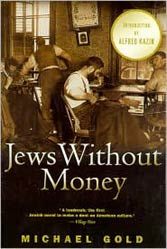Although Jews Without Money (1930) is classed as a proletarian novel, I think its admirability is not due to its proletarian nature. This novel is a tribute to the ability of people, in this case especially Jews, who transcend their circumstances in order to create a life for themselves.
Jews Without Money is a pseudo-autobiographical, fictionalized account of Michael Gold’s growing up in the Lower East Side, his conversion to communism that ends with a temporal leap to his present vision of how to liberate oneself from social injustice and poverty. The novel does not contain a coherent narrative, but rather a series of impressionistic snapshots or vignettes of the Jewish immigrant experience, their daily struggle for survival in the inhospitable environment of America. Although their is an absence of subsistence, there is not an absence of community as they band together in order triumph over their conditions, which suggests that materiality does not define their humanity, but rather their spirit.
What is most remarkable about Gold’s novel is his lurid depiction of the conditions of poverty and the underbelly of New York City’s ethnic neighbourhood. Gold captures it all from the criminals, prostitues and gangs to the vile, infestation of bed bugs in the tenements of the Lower East Side. Subsequently, the vivid picture Gold paints has attracted accusations of sensationalism from critics of the novel.
As the tile of the novel suggests, Gold’s objective is to deconstruct the stereotypical image of the rich Jew by narrativizing the poverty-stricken conditions that the majority of Jewish immigrants grew up in.


























